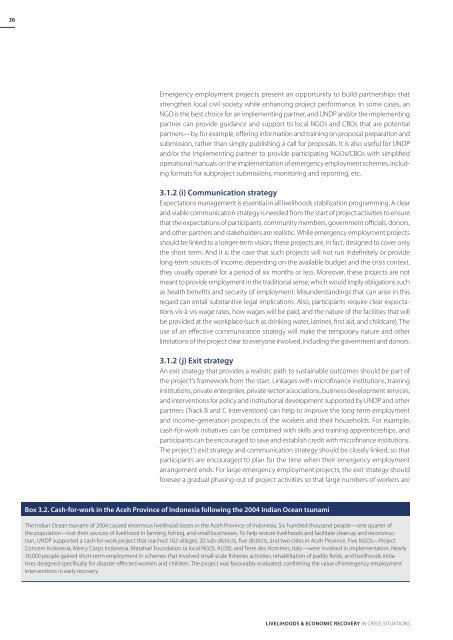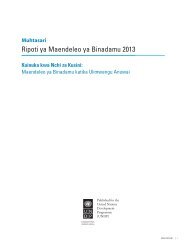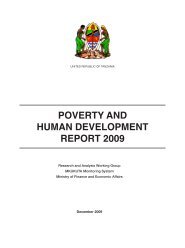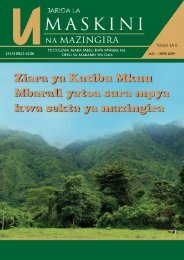Download PDF (4.08 MB) - ReliefWeb
Download PDF (4.08 MB) - ReliefWeb
Download PDF (4.08 MB) - ReliefWeb
Create successful ePaper yourself
Turn your PDF publications into a flip-book with our unique Google optimized e-Paper software.
36<br />
Emergency employment projects present an opportunity to build partnerships that<br />
strengthen local civil society while enhancing project performance. In some cases, an<br />
NGO is the best choice for an implementing partner, and UNDP and/or the implementing<br />
partner can provide guidance and support to local NGOs and CBOs that are potential<br />
partners—by, for example, offering information and training on proposal preparation and<br />
submission, rather than simply publishing a call for proposals. It is also useful for UNDP<br />
and/or the implementing partner to provide participating NGOs/CBOs with simplified<br />
operational manuals on the implementation of emergency employment schemes, including<br />
formats for subproject submissions, monitoring and reporting, etc.<br />
3.1.2 (i) Communication strategy<br />
Expectations management is essential in all livelihoods stabilization programming. A clear<br />
and viable communication strategy is needed from the start of project activities to ensure<br />
that the expectations of participants, community members, government officials, donors,<br />
and other partners and stakeholders are realistic. While emergency employment projects<br />
should be linked to a longer-term vision, these projects are, in fact, designed to cover only<br />
the short term. And it is the case that such projects will not run indefinitely or provide<br />
long-term sources of income; depending on the available budget and the crisis context,<br />
they usually operate for a period of six months or less. Moreover, these projects are not<br />
meant to provide employment in the traditional sense, which would imply obligations such<br />
as health benefits and security of employment. Misunderstandings that can arise in this<br />
regard can entail substantive legal implications. Also, participants require clear expectations<br />
vis-à-vis wage rates, how wages will be paid, and the nature of the facilities that will<br />
be provided at the workplace (such as drinking water, latrines, first aid, and childcare). The<br />
use of an effective communication strategy will make the temporary nature and other<br />
limitations of the project clear to everyone involved, including the government and donors.<br />
3.1.2 (j) Exit strategy<br />
An exit strategy that provides a realistic path to sustainable outcomes should be part of<br />
the project’s framework from the start. Linkages with microfinance institutions, training<br />
institutions, private enterprises, private sector associations, business development services,<br />
and interventions for policy and institutional development supported by UNDP and other<br />
partners (Track B and C interventions) can help to improve the long-term employment<br />
and income-generation prospects of the workers and their households. For example,<br />
cash-for-work initiatives can be combined with skills and training apprenticeships, and<br />
participants can be encouraged to save and establish credit with microfinance institutions.<br />
The project’s exit strategy and communication strategy should be closely linked, so that<br />
participants are encouraged to plan for the time when their emergency employment<br />
arrangement ends. For large emergency employment projects, the exit strategy should<br />
foresee a gradual phasing-out of project activities so that large numbers of workers are<br />
Box 3.2. Cash-for-work in the Aceh Province of Indonesia following the 2004 Indian Ocean tsunami<br />
The Indian Ocean tsunami of 2004 caused enormous livelihood losses in the Aceh Province of Indonesia. Six hundred thousand people—one quarter of<br />
the population—lost their sources of livelihood in farming, fishing, and small businesses. To help restore livelihoods and facilitate cleanup and reconstruction,<br />
UNDP supported a cash-for-work project that reached 162 villages, 20 sub-districts, five districts, and two cities in Aceh Province. Five NGOs—Project<br />
Concern Indonesia, Mercy Corps Indonesia, Matahari Foundation (a local NGO), ALISEI, and Terre des Hommes, Italy—were involved in implementation. Nearly<br />
30,000 people gained short-term employment in schemes that involved small-scale fisheries activities, rehabilitation of paddy fields, and livelihoods initiatives<br />
designed specifically for disaster-affected women and children. The project was favourably evaluated, confirming the value of emergency employment<br />
interventions in early recovery.<br />
Livelihoods & Economic Recovery in Crisis Situations





